In Alissa Sallah‘s graphic novel Weeaboo, there’s a Black high school girl named Maya who writes fanfic, randomly adds Japanese honorifics to her friends’ names, and dresses in Lolita fashion when she goes to school.
I actually had to stop reading for a second, feeling a nostalgic wave of fond secondhand embarrassment, because Maya reminded me so much of myself.
**Spoilers for Weeaboo follow.**
I was the girl in high school (and later college) who lent out Dragon Ball Z VHS tapes to the handful of kids who watched anime. I’d also pass around my old Mead Composition notebook, which was full of “steamy” fanfic between Vegeta and Bulma, before getting a fanfic account and writing copious amounts of Heero and Duo fic from Gundam Wing. One time, when taking French in high school, I gave a presentation on Japan and tried to teach the class how to sing “Just Communication,” the Gundam Wing opening theme by Two-Mix.
And I was definitely dropping in random Japanese honorifics in my fanfic. Chibi Shi-Chan was my very first fanfic handle because of course it was.
I was a whole-ass mess, but in hindsight, my adult self is a lot like that late ’90s/early 2000s girl, minus the endless amounts of “kun” and “san” and having characters randomly speak Japanese mid-sentence because the Yu Yu Hakusho opening ends with “arigato gozaimasu” and, WOW, I just learned a new Japanese word! Sugoi!
This is a feeling that Sallah can relate to. “I was absolutely one of the kids Naruto-running in the hallways and dropping random Japanese words into self-insert fanfictions with my friends,” she said when I spoke to her about her graphic novel. “When I was young, anime was being exposed to American kids more than it had in the past, so young people who were developing their understanding of the world were seeing Japanese culture for the first time through these pieces of media. I think a lot of kids dove excitedly headfirst into every aspect of these shows, even when they sometimes didn’t quite understand it all.”
The graphic novel also feels like something out of the ’90s or 2000s era of anime. “I wanted this book to reflect on the stories that were with me as I was growing up. The more obvious inspirations were Revolutionary Girl Utena, Rose of Versailles, Fooly Cooly, but dozens more make up the soup of influences in this comic. These are all from different decades, but I think the energy of the ’90s through the 2000s is seen the most in Weeaboo.”
What exactly is the Weeaboo graphic novel?
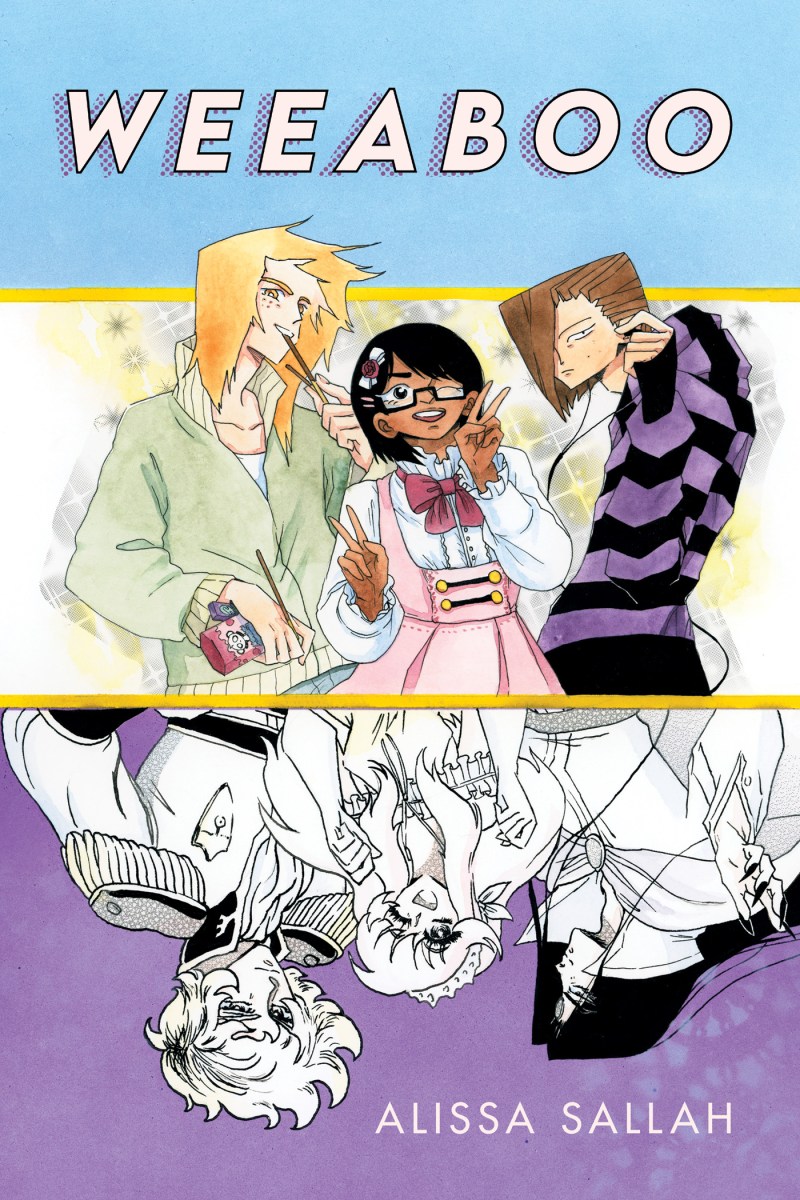
“While words that evolve from the internet and slang leave a little more room for interpretation, I’d describe a weeaboo as a person who is a fan of Japanese pop culture to an obsessive extent. While “nerd,” “geek,” or “otaku” fill similar roles, the term weeaboo started as more of a derogatory description indicating a sort of fetishization,” says Sallah.
“But it’s also important to note how the term came from westerners mocking the idea that someone having an interest in Japanese media was inherently weird. The word has evolved over time, though, as people began to ironically reclaim the title. I think this came from self-awareness as people began to mature with how they interact with the culture and reject the idea that there’s somehow inherent weirdness to embracing Japanese art.”
In the case of Sallah’s graphic novel, we have three friends who feel the way my friends and I did back in the days of buying absolutely every anime we could get our hands on. We existed in our own little world, hung out at Suncoast, and found ways to slip anime into our homework assignments. (Yes, I’m the girl who wrote a whole research paper on yaoi back in college).
Maya, Dan, and James have similar chemistry in Weeaboo, but as I read, I realized that this anime space they created for themselves served as an escape from the harsh realities of the real world. This is reflected through various things, like having unbearable parents, and dealing with racism, homophobia, and coming to terms with the fact that you could be causing harm to those you care about without even realizing it.
You can’t hide in anime forever
Years ago, I saw a post on Tumblr where the OP said something along the lines of being happy that Tumblr didn’t know them when they were 15. This post hit me for two reasons: 1) we do some pretty silly things as kids, and 2) sometimes the things we do are problematic.
I thought of that post when I was reading about Maya.
Like Maya, for me, fandom was (and still is) a space where I could explore who I was as a person. It’s where I first came out (twice, as I came out as lesbian, than bisexual) and where I started to become more vocal about issues that affected me in and out of fandom.
As Sallah said, “I think a healthy dose of fandom community is a great way to explore yourself through the things you like and meet other like-minded people! You can really dive deeper into your interests when other people bring something new to the table that you wouldn’t have thought of yourself. It’s engaging, like a club or sport. You share ideas and expand your interest past its face value. It’s also very comforting to engage with people who understand you on a different level through shared experiences.”
This is why the story goes from the real world, where the main characters are living their day-to-day lives, to the world of the anime they’re planning on cosplaying.
“I wanted to mainly parallel the kind of archetypes within this anime against the characters who are cosplaying them,” Sallah said. “There’s a ‘prince,’ the ‘villain,’ and the ‘heroine,’ so I wanted to play off how the characters in the real world interpret themselves based on these stereotypes, then twist what they represent. There’s also a game of love in the anime, which comes into play with how the main trio feels about each other throughout the narrative and what it means to love.”
But you can’t hide in anime forever.
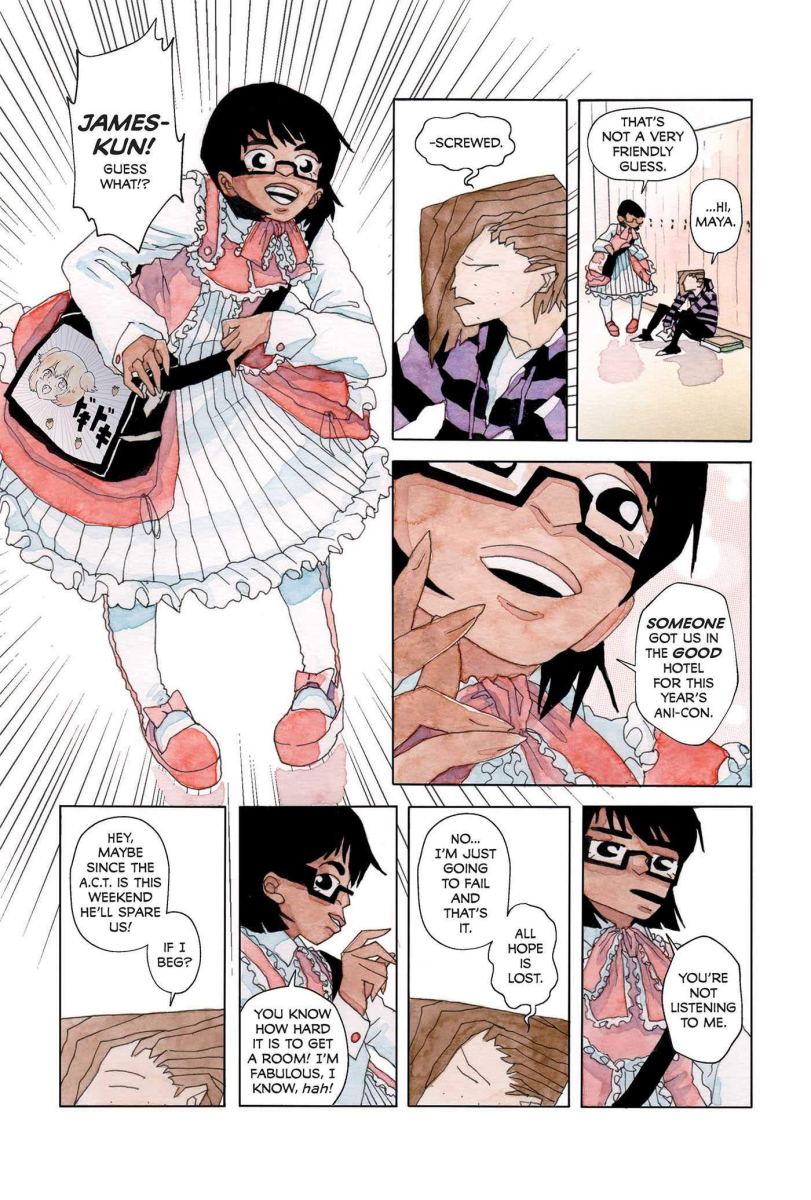
There’s a couple of moments in Weeaboo where reality rears its ugly head in Maya’s space. It happens to all of the characters, actually. Dan doesn’t get the part in the play they’re trying out for, cast in the female part instead of the male role they auditioned for, and James has major family issues going on at home.
Maya is the one who spoke to me the most because her experience was so similar to my own. Not only does she deal with racist comments online, but she sees racist depictions of herself in the anime she loves, straightens her hair to look a certain way, and lives in a house with a grandmother who makes homophobic comments.
As someone who didn’t really start embracing her hair until her thirties, I felt this—a lot. I used to straighten my hair regularly in high school, and in college, when I lost access to the Black hair salon I would frequent, I’d wear anime-themed hats to class. I was surrounded by casual homophobia, too, growing up in the age of calling anything negative “gay” and relatives getting a rise out of other family members by asking “lol, what if she were gay?”
Normally, in stories like this, you wait for the character to have that satisfying moment where they tell someone off about their problematic language. That’s not what happens with Maya.
TMS: There are some issues that feel like they don’t get resolved, for example, Maya’s grandmother says something homophobic, and Maya doesn’t call her out on it. On the one hand, I would’ve loved to see Maya stand up for herself, but I also know that not everyone has the ability to speak against their elders, ESPECIALLY when they still live under their roof.
Is that the point you were trying to get across? Because I feel like there is a real fear we have that if we stand up for ourselves, it’ll turn ugly, and we don’t always have the means to deal with that ugliness.
Sallah: You nailed it. Familial relationships are touchy because they come with a ton of baggage and sensitivity. Maya cares deeply for those in her life, so she would rather doubt her own feelings than risk ruining the “prettiness” of a relationship. She struggles with the notion that it would be disrespectful to confront her grandmother, plus she’s also untangling her own romantic feelings.
Maya’s hiding behind a curtain, and until she’s ready to show her true self, she’s putting on this Wizard of Oz-like act to everyone. She’s not at all in a place where she can stand up for herself because she hasn’t figured herself out yet, either. Maya starts from just being superficially headstrong, to a true strength derived from self-actualization.
I think a lot of people can relate to that story, so it’s important to show that you may not have always had the honesty to push against someone you care about, but it’s a process.
Full disclosure: It would take me YEARS to reach a point where I could correct people like Maya’s grandmother, or walk away from them if it became clear that they weren’t interested in changing their perspective on my life.
When your coping mechanism hurts others
As much as Maya relies on fandom to escape the negatives, the way she navigates through it isn’t perfect, as her actions end up hurting her friend, James. She doesn’t mean to, of course, but the way she continues to use Japanese honorifics in her dialogue begins to rub James, who is half Japanese, the wrong way.
It’s not just Maya who doesn’t realize that this could be seen as a problem. James himself doesn’t realize that this is a problem until he’s around other Japanese people. As someone who went to a predominantly white college, I definitely related to kinda knowing something was problematic, but not wanting to make a fuss because no one would have my back.
It wasn’t until I found spaces with more people like me—even within fandom itself—that I started to feel comfortable enough to say that something bothered me.
TMS: Speaking of James, it hit me pretty hard that he didn’t realize how the “weeaboo” thing could be a problem until he was around more Japanese people. I feel like there are a lot of times where marginalized people don’t process something as potentially being offensive until they are in a space where it can be brought up without backlash.
As a Black queer woman who went to a predominantly white college, there are a lot of comments I let slide because I was the ONLY Black person in the room, and it didn’t catch my attention as being negative until there was finally another Black person to say, “WTF?” Is that what you were trying to demonstrate with James?
Sallah: Absolutely. People can intuitively feel when something bothers them, but don’t always have the words or confidence to parse that. James isn’t very confrontational at first, in part because he doesn’t trust himself to follow what he feels is right. Sometimes you need other people’s perspectives to help build those words.
Even if I get how it feels to be the only marginalized person in a space, that feeling never occurred to me with other marginalized people—not right away. I definitely didn’t realize that the lone Japanese girl in our school’s cosplay club could’ve been looking at my random babbling about things being “kawaii” as offensive. I got it, though, when we all went to a convention together, and I saw attendees fawning over the Japanese girl for … being a Japanese girl.
How many people spoke to her in “I only watch subbed anime” Japanese? I lost track.
It sucks that it took me seeing her discomfort to get it, instead of me being able to realize it on my own, but I was a different person nearly 20 years ago. And, honestly? We never had a real conversation about it. I don’t like admitting that, but it’s true.
Maybe that’s why Weeaboo’s ending spoke to me. The issues are laid out, but nothing is definitively solved.
TMS: This book has a lot of big issues that it’s addressing, but not all of them have a conclusion, so to speak. Even if Maya goes back to doing Lolita because that’s what she loves, she still ends up straightening her hair again. James is able to be free of his parents, but it’s really only for a moment.
Also, he and Maya don’t really talk all that much about the “weeaboo” comment and how her actions bothered him. (They all even end up embracing the word at the end of the story). Much like the homophobia, it would’ve been nice to see these things really addressed. At the same time, I feel like there’s a message of these kids still having a lot of growing to do, but this is at least a start?
Sallah: In my opinion, real life doesn’t have simple resolutions like in our fantasy stories. Deeper growth can’t be made overnight.
If Maya did her hair natural the entire rest of the book, it would be easy to think that she is suddenly freed from any self-doubt by blaming the hairstyle rather than the reason why. Similarly, with James, he is making a bold decision to rebel from his parents but he didn’t suddenly fix his entire home life with this at all. Dan has plenty of work to do, as well.
The world around them didn’t suddenly change with the ending of the play. The messaging is more that real life isn’t about a treasure to find or a world to save—it’s that it’s a web of choices. Everyone’s path is now open to options where they didn’t see them before. There’s a euphoria in that realization that I value.
When it comes to talking, real people don’t confront each other with a checklist of demands. These negotiations of the heart are nuanced, and half of it is made from actions and feelings rather than words. They will have these conversations, but they happen naturally over time. Understanding can come from jokes, from favors, from shared expressions and acceptance.
At the end of it all, this is a story about three people who find inspiration from and love each other.
This is why Sallah decided to have these issues come up in the book. Weeaboo is very much a story about people and fandom, but it also shows several layers to those people and the community they are a part of. “People spend most of their lives trying to connect to others in one way or another, and this is expressed in such a dynamic way through shared interests in art.
Not only is art a conversation between the creator and the receiver, but also through the people who’ve been affected by it,” said Sallah. “I’ve seen so many beautiful moments come from people understanding more about each other through these shared interests or hobbies, I wanted to encapsulate that experience in a way that felt fitting. Fandom isn’t removed from reality but instead a mirror of it, so how do you want to represent yourself in that reflection, ya know?”
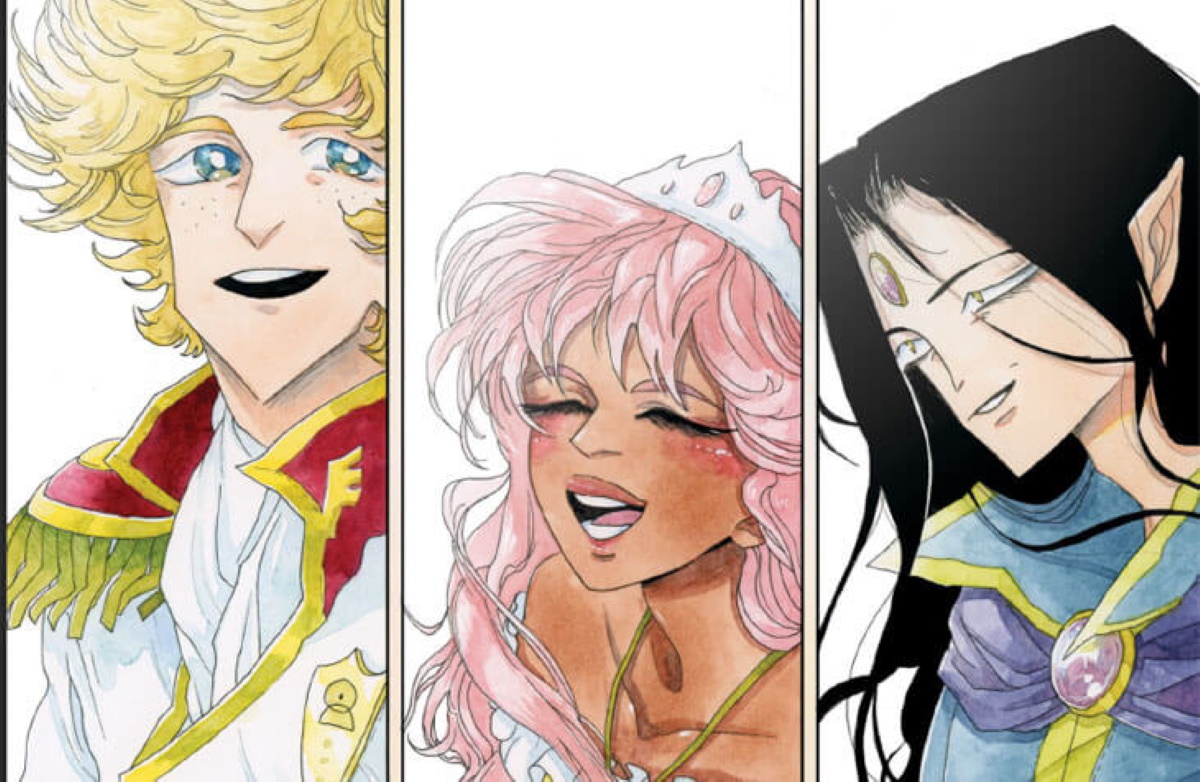
You can check out Weeaboo right over here!
(Image: Alissa Sallah)
Want more stories like this? Become a subscriber and support the site!
—The Mary Sue has a strict comment policy that forbids, but is not limited to, personal insults toward anyone, hate speech, and trolling.—



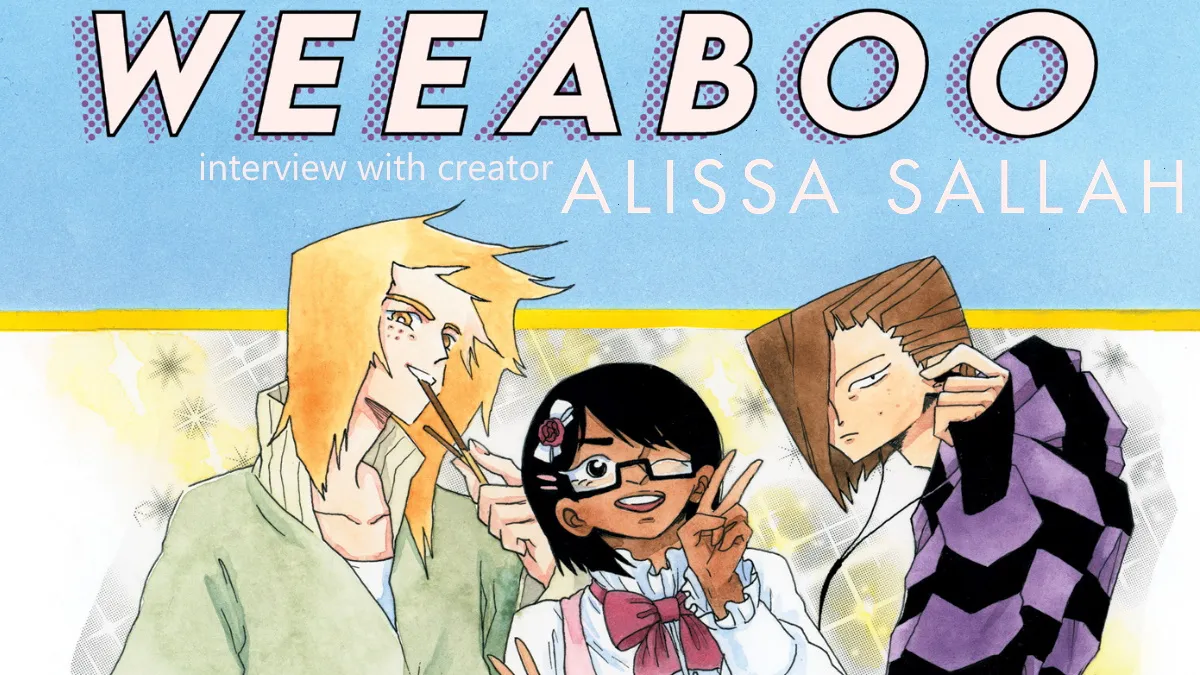

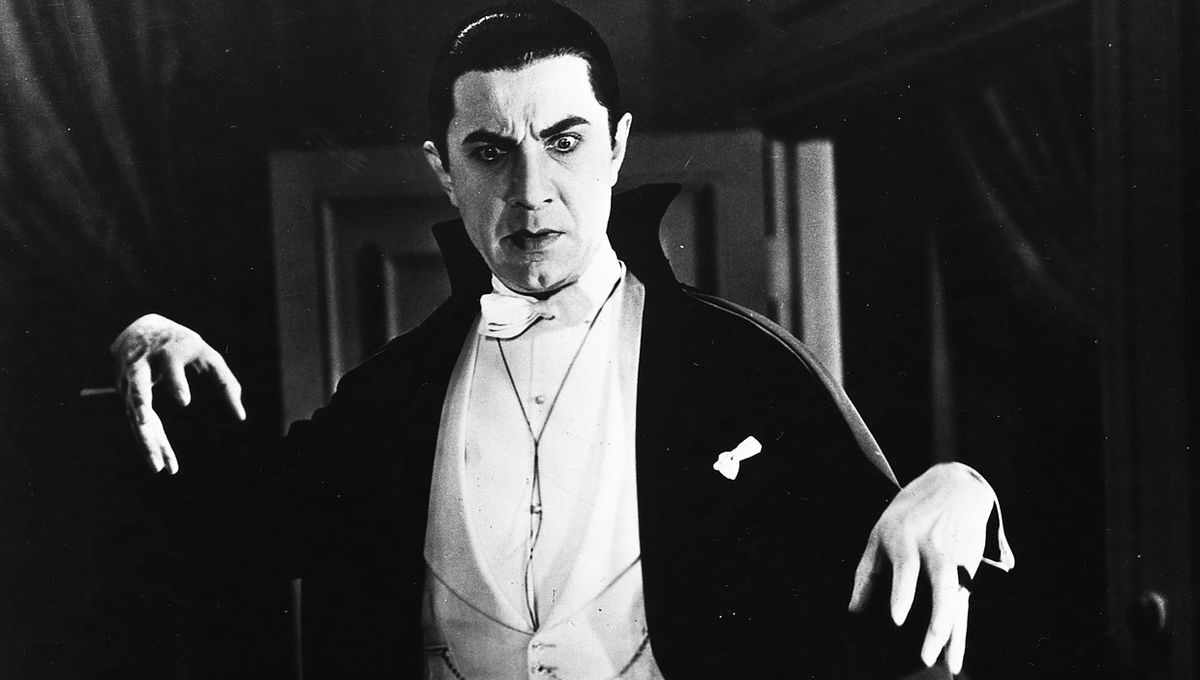




Published: Dec 7, 2021 04:40 pm